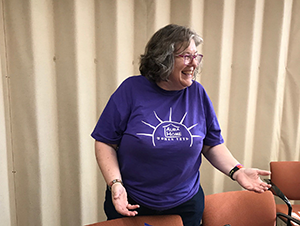Alyce Knaflich does not look like a dynamo women veterans’ rights organizer, but this calmly speaking determined woman has challenged the United States Veterans Administration’s policy on focusing on male veteran’s needs at the expense of women veterans head on. An Army veteran herself, Alyce has experienced firsthand the wide spread experiences shared by women veterans leaving the services with minimal counseling and support the minute they are discharged. She has survived Military Sexual Trauma (MST) and homelessness, turning these experiences into a drive to help other women veterans navigate the maze preventing them from receiving full benefits due to them.
In founding Aura Home Women Vets, Alyce was told at every turn “You can’t do this” which only inspired her to try harder. Now Aura Home Women Vets is a growing non-profit, helping women veterans from all services with housing, counseling, financial guidance across Western North Carolina. Sometimes the only thing preventing a woman veteran from homelessness is as simple as unpaid electric bill.
Alyce’s work with Aura Home Women Vets has received recognition from the Prem Rawat Foundation with its video “Coming Home”.
You can also see Alyce speaking to the DAR September, 2018 on YouTube. She has received volunteer awards from the United States Veterans Administration as well as from AMVETS.

The National Center for Veterans Analysis and Statistics, a program of the Department of Veterans Affairs, estimates that Buncombe County is home to more than 18,000 veterans; some 2,000 of them are women. During this year’s National Point in Time Count on Jan. 31, the Asheville-Buncombe Homeless Initiative counted 554 homeless people, nearly half of whom were veterans.
Homeless women veterans, says Knaflich, tend to be self-reliant, intelligent people with a strong work ethic and a dedication to personal fitness. But posttraumatic stress disorder stemming from such issues as combat, physical assault or other forms of military sexual trauma can wreak havoc with their feeling of being in control, making it even harder for them to ask for help when they need it most. According to the VA’s National Center for PTSD, 1 in 4 women and 1 in 100 men say they’ve experienced sexual trauma in the military.
These experiences can severely undermine a person’s ability to trust. Aura hopes to earn and rebuild that trust. “We’re helping people who’ve served our country,” says Knaflich. “All veterans deserve respect.” To that end, she’s assembled a cadre of dedicated volunteers who are willing to do the heavy lifting, whether it’s cleaning up the building, collecting donations or educating the community.
Mountain Xpress Article September 6, 2018
Alyce Knaflich founded the nonprofit Aura Foundation to serve homeless women veterans in Buncombe, Haywood and Henderson counties. The group is working to renovate a building on Meadowbrook Terrace in Hendersonville to provide women veterans a home while they find the resources to regain independence.
Alyce Knaflich knows how to rise up from the ashes and create a new life: She’s done it time and again. Knaflich was homeless for nine years, wandering and wondering where her next meal would be coming from, never knowing for sure where she’d rest her head.
“When you’re homeless, you don’t have time to think about goals and dreams and schemes,” she says. “Every day becomes another battle for simple survival.”
But battling doesn’t scare this military veteran, and these days, Knaflich is dreaming big. In 2009, she began volunteering for causes that mattered to her, particularly helping women, veterans and homeless people. In 2014, she created the Aura Foundation, a nonprofit that serves homeless women veterans in Buncombe, Haywood and Henderson counties. Two years later, the group bought a building on Meadowbrook Terrace in Hendersonville to house the dream: a place women veterans can call home while they find the resources needed to regain independence.
“Everything takes time and money,” Knaflich explains. “It takes time to get approved for disability, and about everybody gets denied at least once. Appeals can take more than a year. It takes time to get set up with long-term housing, to be able to get money together for rent deposits, to get the money for utility deposits. I want a place where women veterans can find peace while they pull their plans together.”
The building’s owners worked with her, and the group was able to purchase the property — a former assisted living facility that had sat vacant for years — for just $10,600. Then, at the closing, the real estate agent handed her a check for $5,000, and Knaflich thought she was on her way. In fact, however, the journey was just beginning. “It’s been a roller coaster ride,” she says.
